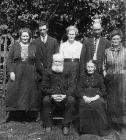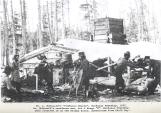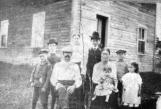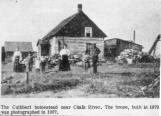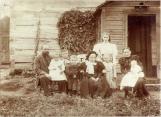1
The PeopleThe area surrounding Chalk River was inhabited mostly by families who pioneered in farming or lumbering. Descendents of these early pioneers have remained in this area and many of the old family names are commonplace in the population of today .
The McCarthys for example can be traced back many years. To mention all the McCarthys would mean a book of its own, however one outstanding McCarthy family is that of Jermiah; as Mrs Jermiah McCarthy, the former Ida Page is the oldest senior citizen of the village today (1979) , and was one who contributed much information to this record.
Mr. Godfrey Page, Ida's father was one of the original settlers in the are east of Highway 17 where the Perlie Lumber Company was operating; while Jermiah was one of the original settlers in the Clarksville area along with his father Felix. At the end of the Town line Road South there is still (1979) a farm called McCarthy's farm.
Many of the village's older families settled originally in the area South and East of Highway 17 in the vicinity of Dukes Crossing, Laundry Crossing, Stewart's Crossing, and Tuckers Creek along what is known today as the Orange Road, as well as in the Corry Lake area behind where the Federal Forestry Headquarters would later be located. The area lying East of Highway 17, extending from the National Defence Petawawa Military Camp as far North as Chalk River was also inhabited. Many of these families, including the Stewarts, Fields, McMilons, Youngs, MacDonalds, Tennants, Brandsteads, Woermkes, Kings, McLeans and Wilsons sold their properties to the Department of National Defence between 1905 and 1907 and moved closer to the village as it exists today.
Other pioneer names living in what was called Clarksville and Coppsville and not mentioned previously are Mulligan, Kennedy, Hollmer, Hawley, McGillis, Christink, McCauley, McQuestion, Owens, Primeau, Brown, McKay, Law, Leach, Bertrand, Hollinger, Laroche, Dardner, Hayes, Lafantaisie, Felthans, Kannaguasser, Hurtubuse, Bushman and Lyons.
Many of these settlers were Irish Protestants, and carried with them into their new location the Orange tradition dating back to the King William of Orange's reign in Ireland. An Orange Lodge was established followed shortly by the building of an Orange Hall in the area known as the Tennant settlement. The Orange Road received its name due to it's proximity to the Orange Lodge. This organization later moved into Chalk River as the settlers did and continued to celebrate the battle of the Boyne each 12th of July with parades etc.
These early settlers were hard willed and did not take kindly to giving up their land to the Department of National Defence. The Defence Department apparently encountered heavy resistance from some settlers in taking over the area. One of the biggest struggles was apparently put up by Jake Stewart Sr. father of Jake Stewart jr. who now (1979) resides in Point Alexander district. Jake Stewart Sr., as told in a 1967 issue of the North Renfrew Times, had to be forcedly removed from the property by Police, and his furniture moved out by the government authorities. Apparently the settlers felt that the Government was offering too little money for the procured land. It is said that their resistance did lead eventually to more favourable land settlements.
As in any community, the personalities of it's residents import a certain unique character and very often a sense of legend's history to the area.
Chalk River is not without it's folk heroes and legendary sons. The Tennant family, prominent even today in the area, deserves special mention. It seems that Mr George Tennant Sr. , now deceased, had an uncanny ability to prescribe herbal cures for a variety of ailments. Mr Tennant's abilities were certainly well appreciated, considering that Doctors were few and far between in those days. Mr Dick Tennant, George's brother, performed many pioneer veterinary services for the areas sick animals. His sister-in-law, Mrs Andy Tennant who acted as midwife, delivered many of today's (1979) village residents. The Tennants and the services of this family were undoubtedly greatly appreciated by the early settlers of the area
Mr Charles Vollrath, also a folk hero became very well known both locally and internationally during the 1930's for his wood carving skills. Charlie, (the father of Edward, Albert, John, Mrs Bertha Durant, Mrs Louise Blimkie, Mrs Freida Baker, and Mrs Elsie Wagner), specialized in carving Animal sculptures which ranged in size from about 2 inches to 4 feet in height. He could be seen regularly during this era practicing his trade along Highway 17 in the Village. This was a fairly creative trade , since there were few people gifted with this skill and the village was ideally located on one of the main tourist routes to the birthplace of the Dionne Quintuplets. Mr Vollrath must have been busy as a beaver, carving all his animals, moose, deer, beaver etc. He busied himself during the winter months, by shipping his carvings to various locations abroad.
Many middle aged villagers living in Chalk River today (1979), still remember Chalk River during the depression years. Our community, as well as many others had large numbers of men out of work. Consequently, in order to feed, house, and get men off the roads, the government set up camps where they could be accommodated and in return do light forestry work. The pay was small , (20 cents a day) but the food was nourishing and free of charge. A camp such as this , housing approximately 500 men was set up across Corry Lake in conjunction with and under the supervision of the Federal Forestry.
Some of these men were well educated as well as talented. Such was the case of Mr. Bill Ormaston, who noted that many of the boys around were between the ages of 14 and 17 and whose parents had a steady income. He decided to approach the parents to form a Brass and Reed Band. In less than two years Bill not only had his Band successfully operating, but had sold enough music that the Selmore Music Company donated him a new 1935 Ford car. The basement of the Presbyterian Church (presently the location of the library) was used as a Band room. Within two years Bill and the Chalk River Boys Band competed at the Toronto and the Ottawa Exhibitions, as well as doing concerts and playing marches for different organizations at various locations. The C.P.R. played an important role by providing free transportation. If one looks closely at the tunics in the picture , you can see C.P.R.. As the war of 1939 came upon us the band lost its membership rapidly. Two members, Luke McCarthy, son of Mrs Jerry McCarthy and Douglas McGillis, son of Mr & Mrs George McGillis joined the R.C.H.A. Band at Petawawa.
Chalk River held a very good record in proportion to population regarding enlistment in the armed forces during the Second World War. It is sad to say that three of the boys did not return. Three casualties from the second World War include Leslie McQuestion, son of the late Mr and Mrs Victor McQuestioon; Leonard Kennedy, son of the late Mr and Mrs Wm. Kennedy and brother of Mrs Jean Taylor; and Bernard Owens, son of Mr and Mrs Wm. Owens, brother of Mrs Laura LaChance, Mrs Ada McCarthy, and Mr Bill Owens. The casualty from the first world War was Peter William Bryant. These names as well as the names of other boys killed from the surrounding area can be seen on the cenotaph in the Village.
2
Other pioneer names living in what was called Clarksville and Coppsville and not mentioned previously are Mulligan, Kennedy, Hollmer, Hawley, McGillis, Christink, McCauley, McQuestion, Owens, Primeau, Brown, McKay, Law, Leach, Bertrand, Hollinger, Laroche, Dardner, Hayes, Lafantaisie, Felthans, Kannaguasser, Hurtubuse, Bushman and Lyons.Many of these settlers were Irish Protestants, and carried with them into their new location the Orange tradition dating back to the King William of Orange's reign in Ireland. An Orange Lodge was established followed shortly by the building of an Orange Hall in the area known as the Tennant settlement. The Orange Road received its name due to it's proximity to the Orange Lodge. This organization later moved into Chalk River as the settlers did and continued to celebrate the battle of the Boyne each 12th of July with parades etc.
These early settlers were hard willed and did not take kindly to giving up their land to the Department of National Defence. The Defence Department apparently encountered heavy resistance from some settlers in taking over the area. One of the biggest struggles was apparently put up by Jake Stewart Sr. father of Jake Stewart jr. who now (1979) resides in Point Alexander district. Jake Stewart Sr., as told in a 1967 issue of the North Renfrew Times, had to be forcedly removed from the property by Police, and his furniture moved out by the government authorities. Apparently the settlers felt that the Government was offering too little money for the procured land. It is said that their resistance did lead eventually to more favourable land settlements.
As in any community, the personalities of it's residents import a certain unique character and very often a sense of legend's history to the area.
Chalk River is not without it's folk heroes and legendary sons. The Tennant family, prominent even today in the area, deserves special mention. It seems that Mr George Tennant Sr. , now deceased, had an uncanny ability to prescribe herbal cures for a variety of ailments. Mr Tennant's abilities were certainly well appreciated, considering that Doctors were few and far between in those days. Mr Dick Tennant, George's brother, performed many pioneer veterinary services for the areas sick animals. His sister-in-law, Mrs Andy Tennant who acted as midwife, delivered many of today's (1979) village residents. The Tennants and the services of this family were undoubtedly greatly appreciated by the early settlers of the area
Mr Charles Vollrath, also a folk hero became very well known both locally and internationally during the 1930's for his wood carving skills. Charlie, (the father of Edward, Albert, John, Mrs Bertha Durant, Mrs Louise Blimkie, Mrs Freida Baker, and Mrs Elsie Wagner), specialized in carving Animal sculptures which ranged in size from about 2 inches to 4 feet in height. He could be seen regularly during this era practicing his trade along Highway 17 in the Village. This was a fairly creative trade , since there were few people gifted with this skill and the village was ideally located on one of the main tourist routes to the birthplace of the Dionne Quintuplets. Mr Vollrath must have been busy as a beaver, carving all his animals, moose, deer, beaver etc. He busied himself during the winter months, by shipping his carvings to various locations abroad.
Many middle aged villagers living in Chalk River today (1979), still remember Chalk River during the depression years. Our community, as well as many others had large numbers of men out of work. Consequently, in order to feed, house, and get men off the roads, the government set up camps where they could be accommodated and in return do light forestry work. The pay was small , (20 cents a day) but the food was nourishing and free of charge. A camp such as this , housing approximately 500 men was set up across Corry Lake in conjunction with and under the supervision of the Federal Forestry.
Some of these men were well educated as well as talented. Such was the case of Mr. Bill Ormaston, who noted that many of the boys around were between the ages of 14 and 17 and whose parents had a steady income. He decided to approach the parents to form a Brass and Reed Band. In less than two years Bill not only had his Band successfully operating, but had sold enough music that the Selmore Music Company donated him a new 1935 Ford car. The basement of the Presbyterian Church (presently the location of the library) was used as a Band room. Within two years Bill and the Chalk River Boys Band competed at the Toronto and the Ottawa Exhibitions, as well as doing concerts and playing marches for different organizations at various locations. The C.P.R. played an important role by providing free transportation. If one looks closely at the tunics in the picture , you can see C.P.R.. As the war of 1939 came upon us the band lost its membership rapidly. Two members, Luke McCarthy, son of Mrs Jerry McCarthy and Douglas McGillis, son of Mr & Mrs George McGillis joined the R.C.H.A. Band at Petawawa.
Chalk River held a very good record in proportion to population regarding enlistment in the armed forces during the Second World War. It is sad to say that three of the boys did not return. Three casualties from the second World War include Leslie McQuestion, son of the late Mr and Mrs Victor McQuestioon; Leonard Kennedy, son of the late Mr and Mrs Wm. Kennedy and brother of Mrs Jean Taylor; and Bernard Owens, son of Mr and Mrs Wm. Owens, brother of Mrs Laura LaChance, Mrs Ada McCarthy, and Mr Bill Owens. The casualty from the first world War was Peter William Bryant. These names as well as the names of other boys killed from the surrounding area can be seen on the cenotaph in the Village.
4
William Field was the first J.P. in the district. He had a large Stopping Place and Post Office close to the Chalk River , East of Coppsville and Clarksville. Mr Field came to this location in the late 1880's with his father and brothers Thomas and Augustas. Here he is shown with Mrs. Field (Laura), Guy Field, Mrs J.J.Reynolds (Annie), James S. Field, and Mrs William Bell (Bert).6
Mr. A. McDonalds "Caboose Shanty", Buchanan Township, 1871.Mr McDonald's residence was Lot 1, Range B, Buchanan Township. This location is on the Ottawa River downstream from Chalk Bay.
8
Mr and Mrs Joseph Primeau and family pose infront of the original Primeau home.10
The Cuthbert homestead was built in 1879. It is photographed here with the Cuthbert family in 1907. This home is today, (2005) still owned and occupied by direct descendants of its builder.12
(Audio Text - Winston Cuthbert)That's a picture of William Cuthbert holding his daughter Edith on his knee, I believe it's Charlie Wacker standing next to him, and the other boy is Ira Cuthbert. The woman is Margaret Downey Cuthbert, my great Grandmother, The other two girls are Emma and Leona Legerry, and this is my Grandmother Maria McLoed Cuthbert holding her son Ken Cuthbert, and that would have been about 1900, Ken was born in 1900.
Note: Margaret Downey Cuthbert served the community of Chalk River as Midwife during the latter quarter of the 1800's.
14
Audio Text ; Reuben Law.Q - Is that this farm?
A - Ya, taken from back in the back fields there. That's our house there, and the barns and everything.
Q - When did your family first come to Chalk River?
A - Oh, the first settlers here was back in the 1800's. My Grandfather owned four farms, this one and the back one there that Cuthbert owns now, and one up on the river. My Great grandfather gave his sons each a farm.
NOTE:
In 1831 Robert James Law emigrated from Scotland and in 1848 family records show him farming in Chalk River area, West of Clarksville on what would later become known as Law Road in Wylie Township, (now known as Laurentian Hills.) Three subsequent generations of the Law family were born on this farm where Reuben Law still resides.
